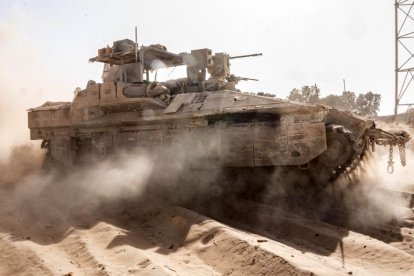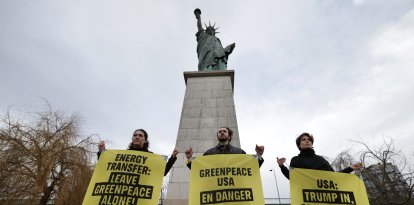Israel is now acting with the long term in mind
The eliminations, recognized or not by Israel, of terrorist leaders, and the continuation of the counter-offensive in Gaza show that this time the Jewish State is really willing to pay the price to bring calm to the region, beyond the hypocritical voices asking it to stop or reduce offensives.

Israeli forces in the Gaza Strip.
With the elimination of Ismail Haniyeh, head of Hamas' political bureau, in a likely Israeli operation, coupled with the recent targeted assassinations acknowledged by Israel of Mohammed Deif, the Islamist group's military leader in Gaza, and Fuad Shukr, the second in command of Hezbollah, among others, the Jewish state is demonstrating that no terrorist is safe, from the most irrelevant to the top leader, no matter where in the world they are. That seems to be the message Israel is giving to its enemies.
Moreover, all indications are that the war in Gaza will continue until Hamas releases the hostages and the Palestinian terrorist group leaves power to make way for a grouping that recognizes Israel as a Jewish and democratic state and abandons violence against Israelis.
The October 7 massacre has been a turning point. Israel no longer thinks in the short or medium term, but in the long term. It knows that the price to be paid will be expensive but temporary, and in order to achieve calm in the region it is necessary to obtain a resounding victory on all fronts.
As Arab-Israeli activist Yoseph Haddad often expresses, "Israel has to speak Arabic," ergo, the Jewish State must crush its enemies in the region, without regard, since its neighbors only understand one language: force.
It should be noted that the peace reached by Israel with Egypt in 1979 and with Jordan in 1994 was not related to a sudden pacifist sentiment of Arab leaders, but to Israeli victories in the wars before the agreements.
Israel paid a high price in the armed conflicts in which it was repeatedly involved as its neighbors sought to wipe it off the map, but its enemies paid an even higher price, especially in the Six-Day War in 1967. And it was for this reason that peace came.
The situation with its neighbors had even taken another positive leap earlier this decade, when Israel reached peace agreements with the United Arab Emirates, Bahrain, Morocco and Sudan, and everything seemed to indicate that, before October 7, the Jewish state was about to sign a similar pact with Saudi Arabia, Iran's main rival in the region, which would surely have resulted in other Arab and/or Muslim countries joining the path of peace with Israel.
Months before the October 7 massacre, when Israel was suffering from a wave of terrorism that included Palestinian terror attacks and missile attacks from Gaza, Lebanon and Syria, Haddad warned in an article published in the Israeli media Mida that the division of Israelis due to infighting over the judicial reform proposed by Prime Minister Benjamin Netanyahu's government was leading to the Jewish state losing its "deterrence capacity."
"It is time to recalculate the route and allow the IDF to speak Arabic," Haddad said. He added: "The policy of containment only postpones the end, and when the time comes to pay, the price will be higher. In the Middle East, any containment is perceived as surrender and weakness."
Haddad, who was severely wounded while fighting Hezbollah in the Second Lebanon War in 2006, referred in his writing to Israel's limited counter-offensives that sought not to escalate the conflict on any front, so, like a fortune-teller, he seemed to predict what would come next: the October 7 massacre, which resulted in what he considers "Israel's Second War of Independence," as he declared in a interview with VOZ days after the terror attack.
Israel is not only waging war against Hamas and other terrorist groups in Gaza, it is also waging war in the north against the Lebanese group Hezbollah, and to a lesser extent against extremists in Syria and Yemen, and indirectly against Iran. This is an unacceptable situation that a large part of the world does not seem to size up correctly or even justify.
This time, however, Israeli authorities seem to be paying attention to what Haddad has been suggesting: thinking in the long term, beyond the hypocritical repudiations of much of the world and the threats of racist and terrorist groups and governments that seek to wipe the Jewish State off the map.
The limited counter-offensives provided short-term calm and ensured that there would not be a full-scale war for some time, but in this way the terrorist groups in Gaza, the West Bank, Lebanon and Syria could use this time of relative tranquility to rearm, improve their infrastructure and plan even stronger attacks against Israel.
The question is a difficult but necessary one: would the October 7 massacre have happened if the IDF had thought about the long term ahead of time by attacking its enemies the way it is doing today?
Threats from Hamas and other Palestinian terrorist groups, Hezbollah, Iran, etc, must be taken seriously, of course, but it should be noted that none of their leaders feel safe today; not in Syria, not in Lebanon, not in Qatar, not in Iran, no matter how important a figure they may be. Israel's strong arm has shown that it can reach them, and that they are not willing to lose power, let alone their lives. Their pride will lead them to perpetrate some attack, sure, as Iran did after the offensive attributed to Israel in Syria, in which a senior commander of Iran's Revolutionary Guard was killed, among other members of that force, but nothing that could provoke an all-out war.
Israel is waging a war on several fronts that is not limited to its borders, no matter who it meddles with, caring less about the price to be paid in the short term and the hypocritical voices of the international community. This makes its deterrence capacity stronger, which is essential for a country surrounded by enemies armed to the teeth and supported by Iran and Qatar, and somewhat more underhandedly by great powers such as China and Russia.
Short-termism is comfortable for short periods of time, but smart decisions, in all areas, must be made with the long term in mind, more so when your very existence depends on such decisions. The voices calling for a "cease-fire" or "restraint" from Israel miss the point, at best.
Journalist Brendan O'Neill pointed out on Spiked that for many media and organizations "attacks on Israel by Hezbollah, Hamas and the Houthis are seen as bad, sure, but it is Israel’s response that is truly feared, that is fretted over as potentially apocalyptic."
O'Neill added that "even following Hamas’s pogrom of October 7, in which it slaughtered more Jews in one day than anyone else had since the Nazis, the woke lost more sleep over Israel’s promise of ‘mighty vengeance’ than they did over Hamas’ fascistic terror." And he remarked that similar situations followed Israeli responses against the Houthis and Hezbollah.
O'Neill's message is clear: Israel must continue to ignore global condemnations, as no other nation whose children were slaughtered by the missiles of a hostile army would be required to do what is required of the Jewish state.
Israel understood that the "escalation" it is being clamored to stop is what Israel itself and the free world needs, but as O'Neill concluded, the identitarian glasses through which the West looks at the Middle East have "blinded it to the truth – and to morality."
RECOMMENDATION





















